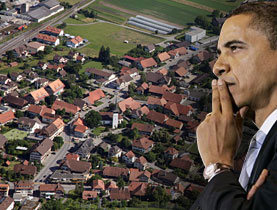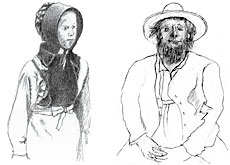Obama could boost genealogy craze

The findings earlier this year that Barack Obama may have some Swiss blood in his veins, whether true or not, indicates a growing interest in genealogy.
People have been encouraged to delve into their ancestry in part due to the large number of websites specialising in genealogy, according to a Swiss archivist.
“More and more books on genealogy have been published over the past 25 years and we have greater demand from people abroad who want to know about their ancestry,” Hans Ulrich Pfister of Zurich’s cantonal archives told swissinfo.
The United States was a magnet for Swiss immigrants – as it was for many Europeans – from the 17th up to the first half of the 20th century.
Many places in the US saw such a large influx of Swiss that they were named after the town or village the immigrants left behind in Switzerland.
In Obama’s case, the US president-elect may be able to trace part of his European roots back to a man by the name of Christian Gutknecht, who emigrated from the village of Bischwiller in what is today the French region of Alsace, but at the time was a Bavarian duchy.
A local archivist in Bischwiller claimed in September that Gutknecht’s parents probably came from canton Bern at the beginning of the 18th century.
Goodnight in America
Gutknecht, who was born in 1722, changed his name to Goodnight in America.
While it seems both Germany and Switzerland want to claim Obama as a native son – six generations removed – the story illustrates the growing interest in immigration among historians and the public.
Pfister says he receives roughly 500 letters of request a year – a quarter of them from abroad.
And about 250 of the 1,000 people who registered with the Zurich archives last year to borrow books were conducting genealogical research. It is a similar story at the archives in other cantons including Fribourg, Bern and Valais that also experienced significant migratory flows abroad.
No emigration records
“Churches kept records on baptisms, marriages and deaths but not on emigrations,” explains Marie-Claire L’Homme of Fribourg’s archives.
Passports only became compulsory during the First World War, therefore “there are no records of the migrations before 1914,” L’Homme says.
“We are glad to help anyone requesting information,” says Karin Hayoz of Bern’s archives. “But it’s asking a lot if you don’t have the ancestor’s first name, any dates or place of birth.”
Hayoz adds the limited budgets of the cantonal archives means few resources can be freed up to deal with genealogy requests.
The data in the records is not listed alphabetically, meaning researchers have to look at every page. “They were written in Latin or the script was Gothic German. It’s possible to conduct the research for a village with 100 inhabitants but for a town or city, just imagine, it’s like a puzzle,” says L’Homme.
Microfilm
“If the requests are complex, we invite the person to come and search through our archives and microfilm. You’ll see quite a few foreigners, usually Americans, in our reading room. If they don’t have any success, we recommend they consult a genealogist,” says Hayoz.
One result in the rise in interest is a growing number of specialist websites. “Genealogy is trendy but [conducting proper research] is expensive since you have to pay by the hour,” relates the genealogist-historian, Benoît de Diesbach.
About nine out of every ten letters of request received at the Fribourg archives come from France since that was the destination of most natives who emigrated from the western Swiss canton. But L’Homme says more and more are from North and South America – a trend confirmed by the other cantonal archives surveyed by swissinfo.
There is another reason for the greater interest. The authorities in Fribourg say that around 20 per cent of the requests are from foreigners who want to reclaim Swiss nationality.
A revised Swiss law that came into effect in 2006 has made this possible for foreigners whose parents or grandparents gave up their Swiss citizenship.
Other people want to know more about their roots at times of uncertainty – when loved ones disperse across great distances or there is a crisis in the family, explains Jean-Claude Romanens, a French-Swiss genealogist.
Romanens says better understanding one’s roots helps people cope in such situations. And genealogy research – once the domain of people over 50 years of age – is attracting more young people.
Teenagers now account for up to 30 per cent of all visitors to Romanens website.
swissinfo, based on an article in French by Isabelle Eichenberger
Benoît de Diesbach, genealogist-historian, deals with between 100 and 200 cases a year, around half from Swiss living abroad.
The requests range from families wishing to know more about their roots or wanting to recover lost citizenship, succession issues or diseases passed down from generation to generation.
Genealogy research rates, according to de Diesbach, range from SFr60 to 300 an hour. Completing a family tree can cost anywhere from SFr1,000 to tens of thousands.
The large American website, ancestry.com, had turnover last year of $160 million and boasts around one million paying subscribers worldwide.

In compliance with the JTI standards
More: SWI swissinfo.ch certified by the Journalism Trust Initiative











You can find an overview of ongoing debates with our journalists here . Please join us!
If you want to start a conversation about a topic raised in this article or want to report factual errors, email us at english@swissinfo.ch.